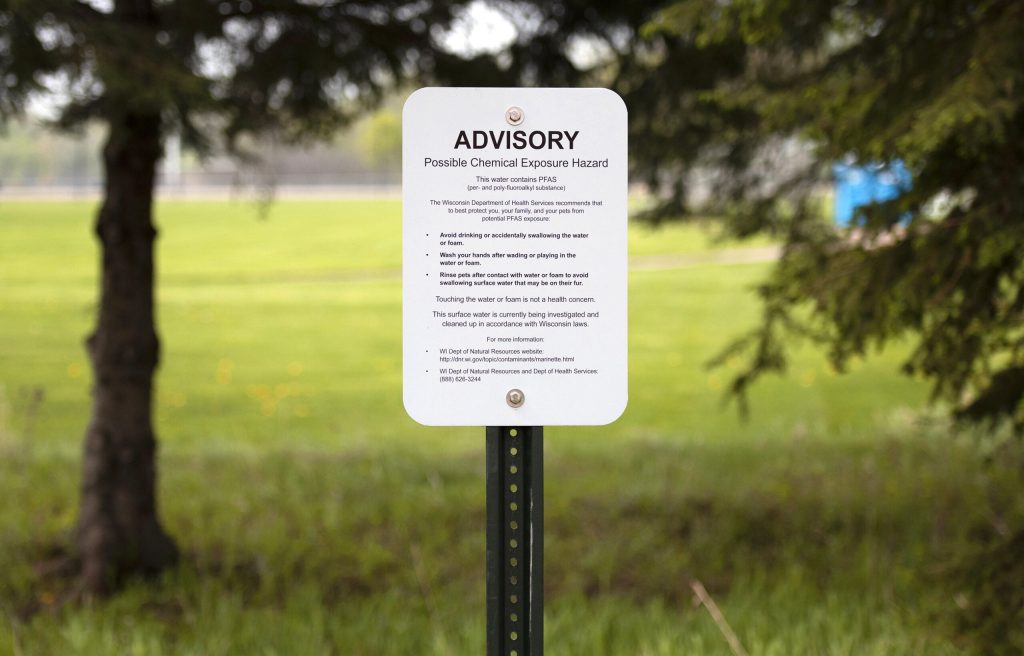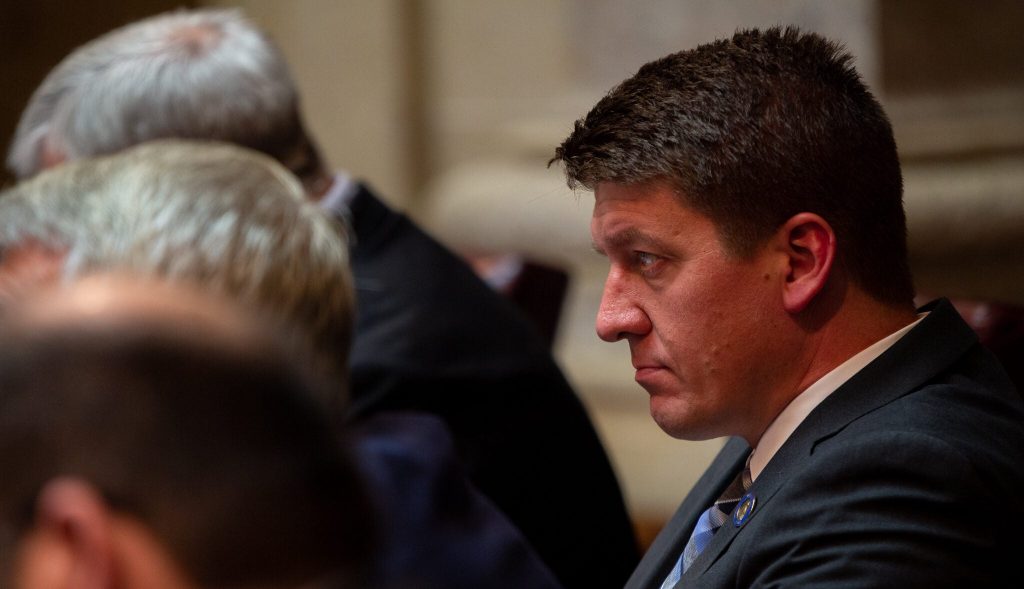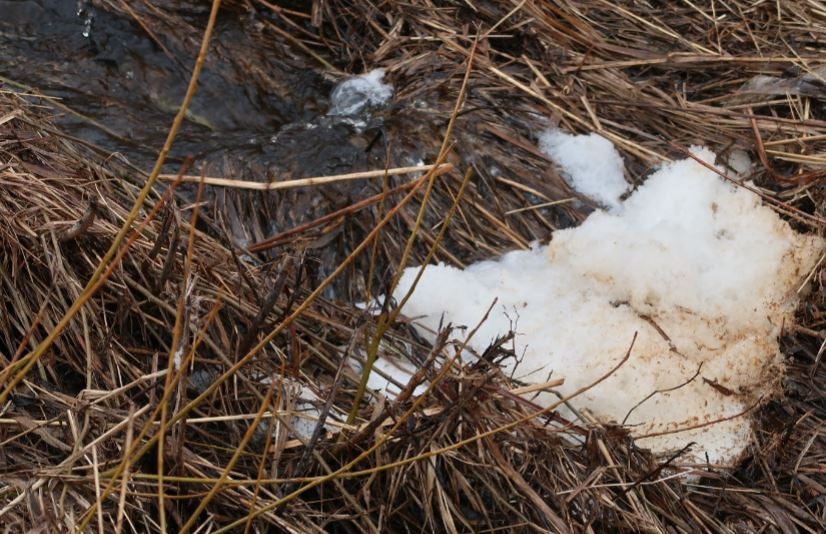Cleanup of PFAS Could Cost Wisconsin Billions
But DNR and GOP legislators need to compromise to create clear standards.

A sign at Marinette High School warns of PFAS contamination in water that runs through the school’s campus Thursday, May 20, 2021. Angela Major/WPR
Wisconsin environmental regulators and Republican lawmakers don’t agree on much when it comes to addressing PFAS contamination, but both acknowledge it will likely cost the state billions of dollars.
The Wisconsin Department of Natural Resources produced a fiscal estimate this fall on one of two PFAS bills introduced by Republicans. The agency’s estimate focused on potential costs of legislation that would exempt individuals and other parties from paying to clean up contamination they didn’t cause under the state’s spills law.
The bill includes exemptions for fire departments, public airports or municipalities that used firefighting foam containing the chemicals for emergencies or training, as well as solid waste disposal facilities. That means the DNR would likely be on the hook for cleanup costs.
The DNR warned the increased cost to taxpayers would be “on the order of billions of dollars” to upgrade public and private water supplies to protect public health. State Sen. Eric Wimberger, R-Oconto, said without his bill those costs would be borne by innocent landowners.
“I fully anticipate that monitoring and upgrading systems will be several billion dollars over the course of multiple budget cycles,” Wimberger said.

Wisconsin state Sen. Eric Wimberger, R-Green Bay, is photographed during a state Senate session on June 28, 2023, in the Wisconsin State Capitol building in Madison, Wis. Drake White-Bergey/Wisconsin Watch
PFAS is an expensive problem
In its fiscal estimate, the DNR focused on known costs to cleaning up PFAS, a class of thousands of synthetic chemicals that don’t break down easily in the environment and have been linked to serious health problems.
The figures don’t include other costs tied to wastewater sampling and site investigations and cleanups.
The estimate represents a worst-case scenario if the state had to test or replace every well, said David Strifling, director of the Water Law and Policy Initiative at Marquette University Law School. He said it’s difficult to assess potential costs when it’s unknown whether a harmful release of PFAS resulted from a polluter or one of the parties that would be exempt under the bill.
“There’s just so much we don’t know here (and) it’s really difficult to come up with an exact number,” Strifling said.
Meleesa Johnson, executive director of Wisconsin’s Green Fire, said without clear PFAS standards, it’s difficult to estimate the bill’s costs. She likened it to seeking an estimate for building a home without knowing its size or dimensions.
“At a minimum, we need groundwater standards, and we need cleanup standards,” Johnson said.

Firefighting foam can be seen in a ditch nearby the Husky oil refinery in Superior the morning after a series of fires and explosion on April 26, 2018. Concerns have grown over the use of firefighting foam that can contain so-called “forever chemicals” known as PFAS. Danielle Kaeding/WPR
Wimberger said quick state action is needed to address PFAS contamination. The state’s rulemaking process can take years. The GOP lawmaker added the Legislature would likely provide additional funds to address PFAS over time.
Wimberger said he’s encouraged by discussions with DNR Secretary Karen Hyun that the state is heading in the right direction on PFAS legislation to make sure that the law “doesn’t wrap up all these people … that you wouldn’t want to hold accountable.”
A DNR spokesperson said the agency and bill authors have had productive conversations “regarding narrow exemptions to the spills law to protect innocent landowners and provide much-needed funding to communities impacted by PFAS contamination.”
Cleanup of PFAS could cost Wisconsin billions, regulators and lawmakers say was originally published by Wisconsin Public Radio.
If you think stories like this are important, become a member of Urban Milwaukee and help support real, independent journalism. Plus you get some cool added benefits.
More about the PFAS Problem
- PFAS Levels in Great Lakes Fish Are Dropping - Danielle Kaeding - Feb 6th, 2026
- Gov. Evers and GOP Lawmakers Near a Deal on PFAS Pollution - Danielle Kaeding - Jan 22nd, 2026
- Gov. Evers Optimistic About Reaching Final Deal With Republican Lawmakers to Secure Release of $125 Million in Long-Awaited Pfas Investments - Gov. Tony Evers - Jan 21st, 2026
- Bipartisan Push to Tell Counties Faster When Water Tests Fail - Henry Redman - Dec 19th, 2025
- MKE County: County Seeks to Sue PFAS Producers, Oil Companies - Graham Kilmer - Dec 10th, 2025
- Wisconsin Reviewing EPA-Approved Pesticides For PFAS - Danielle Kaeding - Dec 9th, 2025
- State Nears Settlement with Johnson Controls/Tyco Over PFAS Spills - Danielle Kaeding - Dec 4th, 2025
- Senate Bill Promotes Soybean-Based Firefighting Foam to Replace PFAS - Danielle Kaeding - Dec 2nd, 2025
- Test Results Show High PFAS Levels in Wisconsin’s Landfill Runoff - Danielle Kaeding - Dec 2nd, 2025
- Wisconsin Communities Get $282 Million for Drinking Water Projects - Danielle Kaeding - Nov 19th, 2025
Read more about PFAS Problem here





















